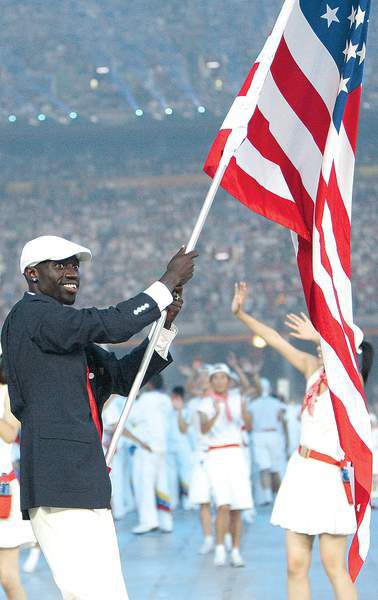’Lost Boy’ carries flag for U.S.
Published 5:00 am Saturday, August 9, 2008

- Lopez Lomong carries the flag of the United States during the opening ceremonies for the Beijing 2008 Olympics on Friday.
BEIJING — “I hope you guys will take my life story,” Lopez Lomong told the media Friday morning, “to learn something out of it.”
The question wasn’t what was there to learn, but what wasn’t there to learn.
Ten hours later, Lomong, a 1,500-meter runner, would be the flag-bearer to lead the U.S. delegation into the Opening Ceremony of the Beijing Olympics. But now, Lomong was telling the story of his life — from the beginning in Sudan.
He talked about how happy he was as a kid until that day he was taken from his family by soldiers at gunpoint. How he spent a decade in a refugee camp in Kenya as one of the Lost Boys of Sudan, by chance saw the 2000 Olympics on television, dreamed of wearing the uniform of the man on the black-and-white screen, Michael Johnson, talked his way into U.S. citizenship …
“And so, here I am.”
Lomong, 23, was only the second naturalized citizen to be a U.S. flag-bearer, joining Olga Fikotova from the 1972 track team. Lomong was selected by U.S. captains, perhaps to send a message to China, which maintains business relations with Sudan despite 300,000 deaths and 2.5 million displaced in Darfur.
Lomong is a member of Team Darfur, a humanitarian effort co-founded by American speed skater Joey Cheek, whose trip to the Olympics was derailed when the Chinese revoked his visa.
“I’m disappointed for Joey Cheek,” Lomong said. “He’s supposed to be here. He’s an Olympian and he’s supposed to tell people about the situation that’s happened.”
Instead, Lomong did.
“I was the happiest kid back in Sudan,” he said.
He and his parents had food, and they kept him sheltered from a war raging in their country. He was a typical 6-year-old — until the morning he was taken.
Soldiers took him and other children, driving them by truck to a one-room prison hut with no windows.
Water was limited and so was the maggot-ridden food.
Three of Lomong’s friends — “I call them my angels” — warned him about carefully removing the maggots, because they could be fatal. Many children did not understand this.
“I witnessed a lot of kids — they would just sit there and suddenly go to sleep and never stand up again,” Lomong said.
Late one night, Lomong and his friends escaped, crawling a few feet at a time as the soldiers talked.
“We went through a fence,” Lomong said. “That’s where my race starts.”
The soldiers chased them, but these kids were exceptionally fast. Olympic fast, you might say.
They ended up crossing the border into northwest Kenya, where they were arrested and taken to a refugee camp with 70,000 others that would be Lomong’s home for 10 years.
In 2000, a man paid him five shillings for providing water for his cow. What would he do with the money? “Maybe God told me to save it till something called the Olympics comes.”
They came. One day, his friends said they were walking 5 miles to watch the Olympics on a black-and-white TV.
Admission: five shillings.
“The first thing that came on was Michael running with the USA jersey on,” Lomong said. “I tell you, he was fast. That’s what inspires me from that point on.”
Lomong was touched by Johnson’s tears upon receiving his 400-meter gold medal, transfixed by the concept of thousands turning out to watch people running.
Running? “It’s part of our transportation,” he said.
He wanted to see more, but he didn’t have another five shillings. If he was going to see the Olympics again, it would have to be another way.
The next year, he was in church when some Americans visited and said the United States was willing to accept 3,500 of the Lost Boys of Sudan. Anyone interested should write an essay explaining his story.
“This is me,” he said, and so he did the best he could.
“Some words in English, I did not have the words,” Lomong said. “I’d write Swahili and English, Swahili and English, then ask, ‘What do you think this word in English is?’, then put in the missing words.”
Like Friday, his words resonated. Soon, he was on a large plane, being met by his new parents, Robert and Barbara Rogers of Tully, N.Y., outside Syracuse. He calls them Dad and Mom.
In time, he learned his natural parents were alive. In 2003, he received a phone call from his mother, Rita Namana, triggering a tearful reunion in which they discovered they had been in the same camp for a while.
After Lopez was taken by the soldiers, his parents assumed he was dead.
“They performed the funeral for me,” he said.
Very much alive, he went on to become a tourism student. At Northern Arizona University-Flagstaff, he won NCAA titles in the 3,000 meters (indoors) and 1,500 (outdoors) before turning pro.
Only three runners from the United States qualify for the Olympics in the 1,500 meters. At the U.S. Trials, Lomong placed third. He casually mentioned how honored he would be to carry the flag into Beijing.
USOC chairman Peter Ueberroth lauded the vote to honor Lomong.
“This is a story of a man with exceptional courage,” Ueberroth said. “It’s a great global story, but also a great American story.”
Lomong has said he hopes athletes can “send a message” to China to stop supporting a system that forces children to grow up in refugee camps. But Friday, his thoughts were on being ambassador as much as an activist.
“I’m so happy, so proud to be an American …” said Lomong, who became a citizen on July 6, 2007, and qualified for the Olympics on July 6, 2008. “I don’t have any word for it.”







